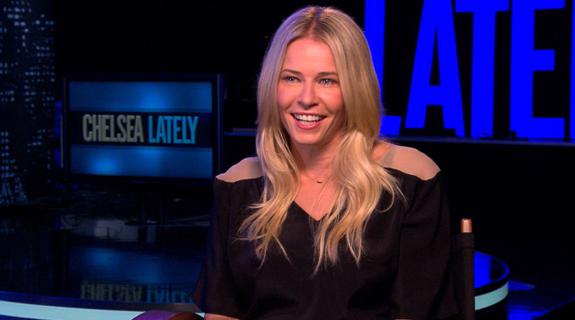In an interview that ran earlier this week, Cindy Holland, VP of original content at Netflix, told “The Hollywood Reporter” that the streaming site is open to all kinds of programming and won’t close its mind to any new ideas:
“I don’t think any genres are off-limits to us,” said Holland. “We don’t have any preconceived notions about what will or won’t work on the service. We’ve been very focused on highly serialized hours and half-hours, and that will continue to be true, but I wouldn’t close the door on any kind of experimentation.”
Just one day later, we’ve learned that experimentation includes a huge deal with former E! talk show host, Chelsea Handler.
Handler just signed a pact with Netflix that includes its very first talk show, set to debut sometime in 2016, along with rights to her most recent standup special, “Uganda Be Kidding Me,” for this October and four docu-specials for 2015. The four episodes, billed as “docu-comedy specials,” will follow Handler as she attempts to learn about subjects such as NASCAR, politics or Silicon Valley.
Netflix, who also just last week revealed its new airy look, says Handler’s talk show will debut simultaneously in all of its territories “for members to enjoy however and whenever they like,” building on her blunt personality that’s made her E! show, comedy tours and books successful.
The talk show format is still unclear, but Netflix says that it will be “the first-ever talk show for the global on-demand generation.” According to Ted Sarandos, Netflix’s chief content officer: “The Internet has disrupted many of the conventions of traditional television and together with Chelsea Handler, Netflix is looking forward to reimagining the late night talk show for the on-demand generation, starting with the late night part.”
This deal was a clear answer to “What will Netflix do next?” But what does it really mean for the streaming service, and how will a talk show for the on-demand generation work, exactly? Series like “House of Cards” and “Orange is the New Black” perform so well on the service because they’re designed to be streamed at the viewer’s discretion (binge-watched, usually). So how does that carry over to a talk show, a format that often relies on topical humor and day-in, day-out viewing habits to stay relevant?
As Vulture.com’s Jesse David Fox put it: “The problem is the ‘late night part’ is the part that matters. Well, not the ‘late,’ but the implication that the ‘night’ means that night. It’s the reason for the medium to exist. Take it away, and what have you got? You can’t be topical on demand.”
Still, Netflix—and Sarandos, Holland and team—is now synonymous with “disruptive” in the TV industry, so if anyone’s got a chance to upset the late-night apple cart, it’s them.
[Image courtesy of Chelsea Lately]
Tags:













































__twocolumncontent.jpg)











